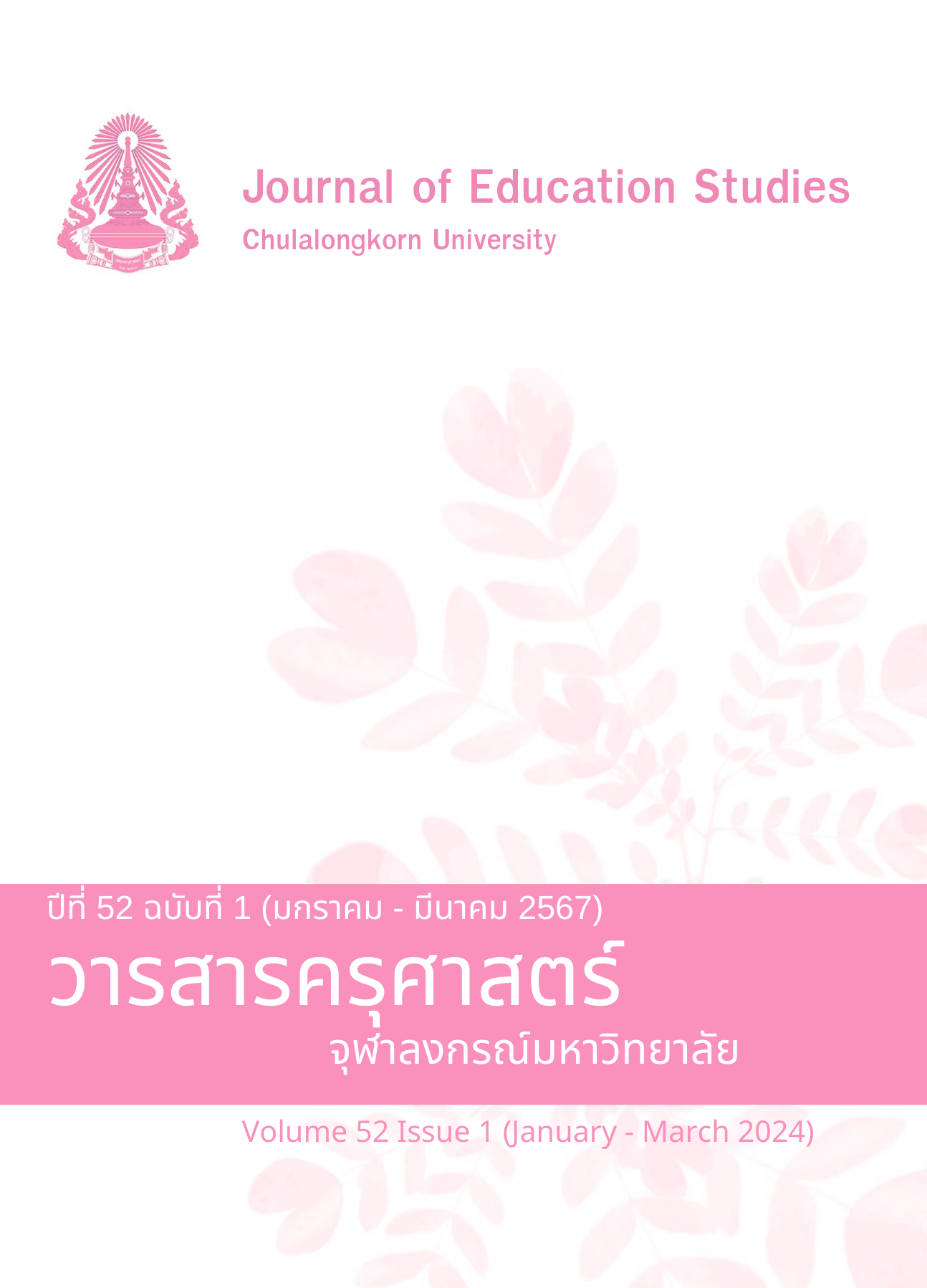Music Teacher Desirable Characteristics in Non-formal Private Music School: Case Study KPN Music Academy in Samutprakarn Province
DOI:
https://doi.org/10.14456/educu.2024.3Keywords:
music teacher characteristics, teacher training, non-formal private music schoolAbstract
This research aimed to investigate the perspectives of music teachers regarding the coveted characteristics of non-formal private school music teachers and to formulate recommendations for fostering these qualities among music teaching professionals. The study adopted a case study approach, focusing on KPN Music Academy in Samut Prakan Province. The participants were comprised of music teachers affiliated with three branches of KPN Music Academy in the province, namely KPN JAS Srinakarin, KPN Robinson Samut Prakan, and KPN Mega Bangna, totaling 71 individuals. The research employed a survey instrument incorporating both quantitative and qualitative inquiries. The results showed the following results: 1) Three desirable characteristics include proficiency in music, pedagogical knowledge, and individual personality. Regarding individual characteristics, a positive attitude, friendliness and, above all, adaptability is considered the most important and desirable characteristic. 2) Proposed guidelines for cultivating these characteristics encompassed engagement in specialized topics, participation in online training programs, provision of individualized mentoring, and the orchestration of collaborative activities for teachers, staffs, and administrators to foster mutual understanding. Specifically, the organized content should delve into the psychology of music pedagogy, while guidelines for instruction and curriculum utilization should be established to uphold educational standards within the institutional framework.
References
ภาษาไทย
กนกวรรณ ศุภสิริโรจน์. (2557). กลยุทธ์การบริหารสู่ความเป็นเลิศของโรงเรียนดนตรีเอกชนนอกระบบ. วารสารครุศาสตร์, 42(4), 1-14.
กิตติพร แซ่แต้.(2560). การศึกษาองค์ประกอบทางธุรกิจสู่ความสำเร็จในการประกอบธุรกิจโรงเรียนดนตรีในประเทศไทย. (สารนิพนธ์ปริญญามหาบัณฑิต, มหาวิทยาลัยเซนจอห์น).
ขนิษฐา รักธรรม & รุจิกาญจน์ สานนท์. (2020). การจัดการสภาพแวดล้อมทางธุรกิจและการสร้างความได้เปรียบทางการแข่งขันของโรงเรียนดนตรียามาฮ่าอำเภอเมือง จังหวัดมหาสารคาม. วารสารวิชาการสังคมศาสตร์ เครือข่ายวิจัยประชาชื่น, 2(2), 34-45
จิตติวิทย์ พิทักษ์, พงษ์พิทยา สัพโส & อิศรา ก้านจักร (2563). สภาพปัญหาเกี่ยวกับการจัดการเรียนการสอนดนตรีของโรงเรียนสาธิตมหาวิทยาลัยขอนแก่น. วารสารศิลปกรรมศาสตร์ มหาวิทยาลัยขอนแก่น, 11(1), 225–237. Retrieved from https://so02.tci-thaijo.org/index.php/fakku/article/view/199499
เจษฎา สุขสนิท (2561). การประเมินความต้องการจำเป็นแบบมีส่วนร่วมในการจัดการศึกษาดนตรีตามมาตรฐานการประกันคุณภาพภายในของโรงเรียนเอกชนนอกระบบ กรณีศึกษา โรงเรียนดนตรีพาเพลิน (สถาบันดนตรีเคพีเอ็น สาขาเซ็นทรัลศาลายา). วารสารครุศาสตร์, 46(1), 18-31.
ณรุทธ์ สุทธจิตต์. (2541). จิตวิทยาการสอนดนตรี. กรุงเทพมหานคร: โรงพิมพ์แห่งจุฬาลงกรณ์มหาวิทยาลัย.
ณัฐธิดา กิ่งเงิน และดนีญา อุทัยสุข. (2560). การรับรู้สภาพปัญหาความเครียดของครูดนตรีในปัจจุบัน. วารสารอิเล็กทรอนิกส์ทางการศึกษา (OJED), 12(3), 491-503.
ธนินท์รัฐ วรพลวิรัตน์, ตรีทิพ บุญแย้ม & ภาวัต อุปถัมภ์เชื้อ (2565). เส้นทางและปัจจัยในการดำเนินธุรกิจของครูดนตรีอิสระ. Journal of Humanities and Social Sciences University of Phayao, 10(2), 273-291.
มานะ พิณจะโปะ (2558). การศึกษาสภาพปัญหาการสอนวิชาดนตรีของโรงเรียนในสังกัดสำนักงานเขตพื้นที่การศึกษามัธยมศึกษา เขต 31. วารสารศิลปกรรมศาสตร์ มหาวิทยาลัยขอนแก่น, 6(2), 139–157. Retrieved from https://so02.tci-thaijo.org/index.php/fakku/article/view/30075
อนันต์ เถื่อนเนาว์. (2561). บทบาทของครูกับการเรียนการสอนในศตวรรษ ที่ 21. ใน มหาวิทยาลัยราชภัฏสวนสุนันทา, รายงานการประชุม การประชุมวิชาการเสนอผลงานวิจัยระดับชาติ ครั้งที่ 2 “Graduate School Conference 2018”. (น. 937- 943). บัณฑิตวิทยาลัย มหาวิทยาลัยราชภัฏสวนสุนันทา.
อัครวัตร เชื่อมกลาง, ทรงเดช แสงนิล และสกุณา พันธุระ. (2560). คุณลักษณะในความต้องการบุคลากรด้านดนตรีของผู้บริหารสถานศึกษาและผู้ประกอบการธุรกิจดนตรีในภาคตะวันออกเฉียงเหนือตอนกลาง Desired Characteristics of Music Personnel for Educational Administrators and Music Entrepreneurs in Central Northeastern Thailand. Chophayom Journal, 28(2), 169-176.
ภาษาอังกฤษ
Arat, M. (2014). Acquiring soft skills at university. Journal of educational and instructional studies in the world, 4(3), 46-51.
Biasutti, M., & Concina, E. (2018). The effective music teacher: the influence of personal, social, and cognitive dimensions on music teacher self-efficacy. Musicae Scientiae, 22(2), 264 - 279.
Carey, G., Coutts, L., Grant, C., Harrison, S., & Dwyer, R. (2018). Enhancing learning and teaching in the tertiary music studio through reflection and collaboration. Music Education Research, 20(4), 399-411.
Fernandes, P. R. D. S., Jardim, J., & Lopes, M. C. D. S. (2021). The Soft Skills of Special Education Teachers: Evidence from The Literature. Education Sciences, 11(3), 125.
Gupta, M. K., & Varsakiya, J. (2021). Professional web meetings and online seminars: Pros and Cons. International Journal of AYUSH Case Reports, 5(1), 47-48.
Kaschub, M., & Smith, J. (Eds.). (2014). Promising practices in 21st century music teacher education. Oxford University Press.
Kechagias, K. (2011). Teaching and Assessing Soft Skills. MASS Project. Retrieved from http://research.education.nmsu.edu/files/2014/01/396_MASS-wp4-final-report-part-1.pdf
Klaus, P. (2007). The hard truth about soft skills: Workplace lessons smart people wish they’d
learned sooner. New York, NY: HarperCollins.
Lopes, A., & Dewan, I. (2014). Precarious Pedagogies? The Impact of Casual and Zero-Hour Contracts in Higher Education. Journal of Feminist Scholarship, 7(8).
Marone, V., & Rodriguez, R. C. (2019). “What’s so awesome with YouTube”: Learning music with social media celebrities. Online Journal of Communication and Media Technologies, 9(4), e201928. https://doi.org/10.29333/ojcmt/5955
Mailool, J., Retnawati, H., Arifin, S., Kesuma, A. T., & Putranta, H. (2020). Lecturers’ experiences in teaching soft skills in teacher profession education program (TPEP) in Indonesia. Problems of Education in the 21st Century, 78(2), 215.
McClellan, E. (2017). A Social-Cognitive Theoretical Framework for Examining Music Teacher Identity. Action, Criticism & Theory for Music Education, 16(2).
McPhail, G. J. (2010). Crossing boundaries: Sharing concepts of music teaching from classroom to studio. Music Education Research, 12(1), 33-45.
Steele, N. A. (2010). Three characteristics of effective teachers. Update: Applications of Research in Music Education, 28(2), 71-78.
Upitis, R., Abrami, P. C., Brook, J., Boese, K., & King, M. (2017). Characteristics of independent music teachers. Music Education Research, 19(2), 169-194.
Downloads
Published
How to Cite
Issue
Section
License

This work is licensed under a Creative Commons Attribution-NonCommercial-NoDerivatives 4.0 International License.




